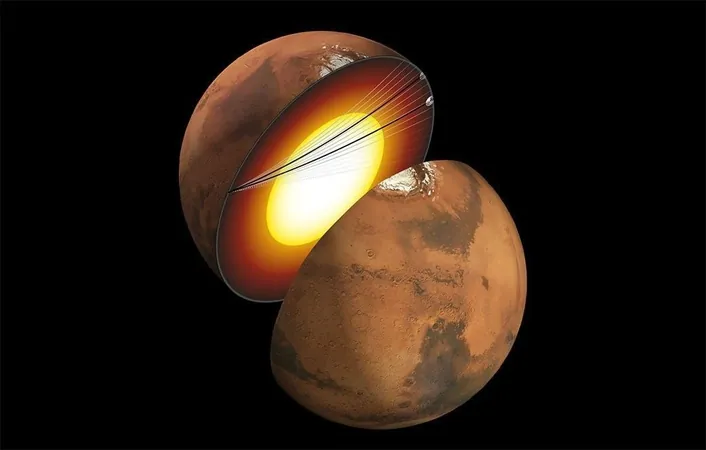
Is Mars Hiding an Underground Ocean? New Findings Suggest It Might!
2025-05-13
Author: Siti
A Hidden Ocean Beneath Mars?
Deep beneath the dusty red surface of Mars, an astonishing secret could change everything we thought we knew about our neighboring planet: a colossal reservoir of liquid water may be lurking in the depths of its crust.
Mars once hosted ample bodies of water, but scientists have long been puzzled over its disappearance as the planet transformed into the arid landscape we see today. New research sheds light on this enigma.
Unlocking the Mystery of Ancient Water
Mars wasn’t always the desolate desert it is now. During the Noachian and Hesperian periods—around 4.1 to 3 billion years ago—rivers created valleys and lakes glittered under the sun. However, as the planet's magnetic shield waned and its atmosphere thinned, much of the surface water evaporated or crystallized.
Calculating the total water loss, scientists believe that the so-called "missing" water could envelop Mars in an ocean over 700 meters deep! The mystery lies in where this water has gone. Some theories suggest it may have infiltrated the planet's crust through fractures created by ancient meteorite impacts.
Seismology Reveals a Hidden Layer of Water
NASA's InSight mission has revolutionized our understanding by using seismic data to map Mars’ underground structure. The lander, equipped with a sensitive seismometer, detected peculiar seismic waves that travel unusually slow at depths between 5.4 and 8 kilometers—a strong indication of a porous, water-filled layer.
This ‘low-velocity layer’ is akin to Earth’s aquifers, potentially holding a staggering amount of water, enough to cover the whole planet in an ocean 520 to 780 meters deep.
The Role of Meteorites and Marsquakes
The groundbreaking discovery was made possible by recent meteorite impacts and a marsquake. These seismic activities sent ripples of vibrations through Mars’ crust, similar to drops of water creating waves in a pond. By analyzing these waves, researchers could pinpoint the presence of water-soaked layers hidden beneath the surface.
Why This Discovery is Game-Changing
Water is the cornerstone of life as we know it. Could microbial life, remnants of ancient Martian ecosystems, exist in these underground reservoirs? This discovery holds monumental implications for future human exploration—delivering water, oxygen, or even fuel!
While extracting water from kilometers deep is a formidable challenge, this research points to additional potential reservoirs around Mars, such as the icy mud in Utopia Planitia.
What Lies Ahead for Mars Exploration?
The seismic data gathered so far covers only a fraction of Mars. Future missions with advanced seismometers could help map out further water-rich zones. Rovers or drill missions could potentially analyze these water deposits, tracking signs of life and ensuring the protection of any native biology.
For now, Mars invites us to continue listening to its seismic song, revealing secrets of a planet that may be more like Earth than we ever imagined.





 Brasil (PT)
Brasil (PT)
 Canada (EN)
Canada (EN)
 Chile (ES)
Chile (ES)
 Česko (CS)
Česko (CS)
 대한민국 (KO)
대한민국 (KO)
 España (ES)
España (ES)
 France (FR)
France (FR)
 Hong Kong (EN)
Hong Kong (EN)
 Italia (IT)
Italia (IT)
 日本 (JA)
日本 (JA)
 Magyarország (HU)
Magyarország (HU)
 Norge (NO)
Norge (NO)
 Polska (PL)
Polska (PL)
 Schweiz (DE)
Schweiz (DE)
 Singapore (EN)
Singapore (EN)
 Sverige (SV)
Sverige (SV)
 Suomi (FI)
Suomi (FI)
 Türkiye (TR)
Türkiye (TR)
 الإمارات العربية المتحدة (AR)
الإمارات العربية المتحدة (AR)